Ed Gorman's Blog, page 13
November 29, 2015
From Stark House: Fell The Angels Catharine Butzen
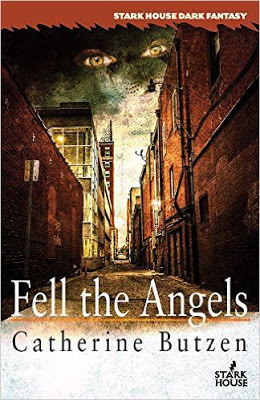
Catherine ButzenFell the Angels978-1-933586-89-2 $17.95
Stark House Press introduced the Fell the Angels characters in Catherine Butzen’s first novel, Thief of Midnight, back in 2010. The main character, Abby Marquise, works in Chicago for the Society for the Security of Reality, keeping the world area safe from the nefarious plots of such mythical creatures as boogymen, werewolves, ghouls and faeries.
In Thief of Midnight, there is a plot by the bogeymen--their existence threatened by dying belief--to kidnap children and create a reign of terror. In Fell the Angels, Abby and her group have to deal with a group of rogue selkies who are in league with a group of power-hungry faeries.
Reviews for Thief of Midnight include this from Publishers Weekly: “Butzen's strong debut livens up some common urban fantasy tropes with witty dialogue and fun monsters.”
Her new fantasy mystery is darker—and even stronger.
In fact, Fell the Angels just received a PW review in late October, in which the reviewer had this to say: "Butzen keeps the action moving quickly, with plenty of fights distracting Abby and John from their search for the killer, but also tosses in some delightfully grim humor... fans of the formula will enjoy the ride."
Part urban fantasy, part detective thriller, Fell the Angels is the second book in the Abby Marquise series. Available now from Stark House Press at www.starkhousepress.com.
Published on November 29, 2015 17:10
November 28, 2015
BODY DOUBLE - A DISCUSSION
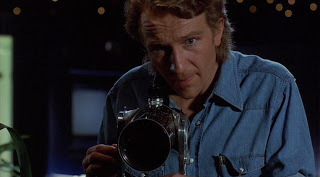 Ed here: This is a discussion from http://www.classicfilmtvcafe.com/TCM Movie Morlocks. Even though I think Body Doubles is something of a mess structurally I enjoyed it and find this discussion entertaining.Sark and Rick Discuss Brian De Palma's "Body Double"This post is being republished as part of ClassicBecky's and Dorian'sThe Best Hitchcock Movies (That Hitchcock Never Made) blogathon. Click
here
to read other entries in the blogathon.
Ed here: This is a discussion from http://www.classicfilmtvcafe.com/TCM Movie Morlocks. Even though I think Body Doubles is something of a mess structurally I enjoyed it and find this discussion entertaining.Sark and Rick Discuss Brian De Palma's "Body Double"This post is being republished as part of ClassicBecky's and Dorian'sThe Best Hitchcock Movies (That Hitchcock Never Made) blogathon. Click
here
to read other entries in the blogathon.This discussion of Body Double (1984) between film fans from different generations assumes that you’ve seen the film. But if you haven’t—or have, but need a plot refresher--here’s a synopsis:Actor Jake Scully (Craig Wasson) experiences a debilitating episode of claustrophobia on the set of a low-budget horror film. Dismissed for the day, he discovers his girlfriend Carol making love to another man. Later, he learns that he has been fired from the movie. Since Carol owned the house they shared, Jake needs to find new lodgings. His luck improves when another actor, Sam, offers a house-sitting gig. One of the perks of the observatory-like house is a telescope aimed at the window of an attractive woman who performs a provocative dance routine every night. Jake becomes obsessed with his "window" neighbor, but becomes concerned when he spies another man watching and following her. (Body Double is rated R for adult themes, nudity, and violence.)
Rick29: Sark, you once said that De Palma’s best Hitchcock homages were the ones where he took Hitchcockian themes and turned them on their head. I think Body Double is a great example of that. On the surface, Body Double is a suspense film--and a very good one. But underneath the surface, it's a witty film about acting and deception. When Jake freezes up while reliving the "sardine game" in his acting class, the teacher yells at him: "You've got to act!" That's just what everyone around Jake does throughout the rest of the movie. Alexander Revelle acts the role of Sam who, in turn, acts the role of "the Indian." Holly acts out of the role of Gloria. Even Jake gets in the game, acting out the role of an adult film producer. The scene over the closing credit is a perfect coda, where De Palma shows us a body double in a shower scene in the horror film. Holly, who is standing beside the lead actress, tells her: "I bet this will get you a lot of dates." Thus, more deception will be promulgated!for the rest go here: http://www.classicfilmtvcafe.com/
Published on November 28, 2015 17:56
Barry Malzberg: Queen's Gambit
A posting to Rara Avis, that mystery discussion group.
Patti Abbot, bless her, fails to see the fragility, the passion, the divided self and agonizing struggle of Elizabeth Harmon to supersede her damaged history and psyche, Patti Abbot mistakenly sees this novel as ideologically centered (anti-Commie) when politics is the shell, not the meaning, the distraction, not the soul. She does not appear to understand the complexity of the characters, all of them or that they are all in thrall to chess itself which in this great novel is no metaphor but is the shape and expression of our condition.
In 1964 in Syracuse, my wife and I saw THE HUSTLER in a local theater (the second time I had seen it) as did our friend, the great poet Trim Bissell who said then "It's a nice film but I have come to the conclusion that it is _only_ about pool." And I did not have the wit to give him the proper response until years later after he had jumped bail and gone underground for seventeen years meaning that when they finally caught him we surely would have had other matters to discuss. So I must settle again for giving that proper answer to rara avis, such empty (but always earnest) forum: "Trim, you are right. Of course you are. But in being right you have isolated not the weakness of the work but its stunning power. Because if if a work of art is truly about something, embraces its subject wholly, explores it to the absolute, then it has taken the world itself."
Poor Trim. (1942-2002) Poor Elizabeth Harmon. Poor Boris Spassky. Poor Bobby Fischer. The world in all its elegance, intricacy and darkness.Barry N. Malzberg
Patti Abbot, bless her, fails to see the fragility, the passion, the divided self and agonizing struggle of Elizabeth Harmon to supersede her damaged history and psyche, Patti Abbot mistakenly sees this novel as ideologically centered (anti-Commie) when politics is the shell, not the meaning, the distraction, not the soul. She does not appear to understand the complexity of the characters, all of them or that they are all in thrall to chess itself which in this great novel is no metaphor but is the shape and expression of our condition.
In 1964 in Syracuse, my wife and I saw THE HUSTLER in a local theater (the second time I had seen it) as did our friend, the great poet Trim Bissell who said then "It's a nice film but I have come to the conclusion that it is _only_ about pool." And I did not have the wit to give him the proper response until years later after he had jumped bail and gone underground for seventeen years meaning that when they finally caught him we surely would have had other matters to discuss. So I must settle again for giving that proper answer to rara avis, such empty (but always earnest) forum: "Trim, you are right. Of course you are. But in being right you have isolated not the weakness of the work but its stunning power. Because if if a work of art is truly about something, embraces its subject wholly, explores it to the absolute, then it has taken the world itself."
Poor Trim. (1942-2002) Poor Elizabeth Harmon. Poor Boris Spassky. Poor Bobby Fischer. The world in all its elegance, intricacy and darkness.Barry N. Malzberg
Published on November 28, 2015 09:24
November 26, 2015
Thanksgiving; My favorite quote about actor David Canary's passing
Ed here: We had a long and perfect lunch with my son Joe and his entire family yesterday. Even our oldest grandchild Shannon was back from the Naval Academy. After next year she'll be spending five years on various ships around the world. We'll see her even less. I baby sat her three afternoons a week when she was 2 1/2-5 years old. She was such a sweet, hilarious little girl. And now she's a sweet, hilarious--and brilliant--young woman.
----
Actor David Canary died Friday. I always enjoyed his work. A real pro, good guy or bad, soap operas or westerns, so I read his obits. This sardonic line from the NY Times made me smile as I'm sure it would have Mr. Canary himself.:
"Mr. Canary’s first taste of soap-opera drama came in 1965, when he was cast as Dr. Russ Gehring, Mia Farrow’s physical therapist, in “Peyton Place.” Ms. Farrow’s character was in a coma at the time, so their interaction was minimal."
----
Actor David Canary died Friday. I always enjoyed his work. A real pro, good guy or bad, soap operas or westerns, so I read his obits. This sardonic line from the NY Times made me smile as I'm sure it would have Mr. Canary himself.:
"Mr. Canary’s first taste of soap-opera drama came in 1965, when he was cast as Dr. Russ Gehring, Mia Farrow’s physical therapist, in “Peyton Place.” Ms. Farrow’s character was in a coma at the time, so their interaction was minimal."
Published on November 26, 2015 09:53
November 25, 2015
Dave Zeltserman reviews At the End of a Dull Day by Massimo Carlotto
Review of At the End of a Dull Day by Massimo Carlotto
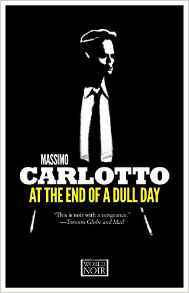
AT THE END OF A DULL DAY by Massimo Carlotto is the kind of tough, take-no-prisoners crime novel that had me falling in love with the genre back when I was a kid reading Spillane, Cain, and Hammett. The anti-hero of this novel, Giorgio Pellegrini, is not a nice man, to put it lightly. He’s at least as ruthless as my own Kyle Nevin, and he might even be more of a sociopath. Earlier in his life, Giorgio had been a criminal and a terrorist, now thanks to his benefactor, the Honorable Counselor Brianese, his record has been scrubbed clean and he owns a popular restaurant in the Veneto region of Italy where Brianese operates in the backroom taking bribes and conducting shady government business. Giorgio might be living a more respectable life now, but he keeps his fingers dirty, operating a small prostitution ring wth his old friend, ex-lover, and partner Nicoletta which he uses to supply Brianese and his political cronies. The way Giorgio disposes of these prostitutes every six months so that they can’t accumulate any secrets that can harm the Honorable Brianese is particularly cruel. But as I said earlier, Giorgio is not a nice man. Even without learning about what he does to these prostitutes, all you have to do is see the way he dominates every aspect of his wife’s life to make her little more than a docile servant to understand that.
So life is good for Giorgio. He’s wealthy, respected, living for him a nice dull life. And then shit happens. Brianese decides to steal two million euros that Giorgio had entrusted with him to invest. When Giorgio leaves Brianese a message by breaking into the Honorable Counselor’s home and disfiguring the maid with brass knuckles, shit really happens. Instead of Brianese taking the intended message--that Giorgio isn’t someone to be messed around with—he now looks at Giorgio as a savage who needs to be removed. And that’s really where the beauty of this novel shows up—as despicable as Giorgio might be, with all the double-crosses that follow, which include being sold out to the mafia, you can’t help but root for Giorgio as he tries to claw his way back to the way things were before Brianese’s initial betrayal.
POSTED BY DAVE ZELTSERMAN AT 11:07 AMNO COMMENTS:
Published on November 25, 2015 11:22
November 24, 2015
I'm not a bond fan but happy thanksgiving-great review of fleming's letters
for the entire review go here:
http://www.nytimes.com/2015/11/24/boo...
by Jennifer Senior
Ian Fleming adored women, fast cars, golf, martinis and cards, and he cheerfully assigned these same hobbies to his most famous fictional creation, Agent 007. But “The Man With the Golden Typewriter: Ian Fleming’s James Bond Letters” is much less about Fleming’s glamorous cavorting than it is about his brazen hustle to become a famous commercial novelist. This will come as a disappointment, perhaps, to anyone who dives into this collection and expects an orgy of vice. But to anyone who has ever worked on a book — writing one, editing one, marketing one, publishing one — or, heck, even just read one, this volume is a giant stalk of catnip.
Open to almost any page and you’ll find something irresistible. My favorite exchanges are those between Fleming and two of his most trusted readers, William Plomer and Daniel George, to whom he sent early drafts of each Bond installment. While they almost always found something wonderful to say — “I got so fond of Dr. No I was quite sorry to see him vanish under a mound of excreta,” Mr. Plomer wrote in 1957 — they were positively unsparing in their critiques of Fleming’s stylistic tics and idiosyncrasies. There isn’t space to list them all, but here’s a modest sampling:
“I don’t think M. ought so often to speak ‘drily.’”“Shoulder-shrugging, I regret to say, is too much in evidence.”“On some pages the sentences all begin with ‘And.’ I can’t see the point of this. Presumably you are aiming at producing an effect of panting continuity. Take out all the ‘Ands’ and see if it makes any difference.”
Mr. Plomer also offered more practical criticisms, noting how improbable it was that a fly-button would be the first thing to dislodge from Bond’s pants as he lay spread-eagle on a saw table, a circular blade whirring toward his groin. (A memorable scene in “Goldfinger.”) “Didn’t other objects get in the way first,” Mr. Plomer asked, “or does Bond have undescended testicles?”
Published on November 24, 2015 11:06
November 23, 2015
Seven Things to Know About Sydney Greenstreet
THURSDAY, NOVEMBER 19, 2015http://www.classicfilmtvcafe.comSeven Things to Know About Sydney Greenstreet
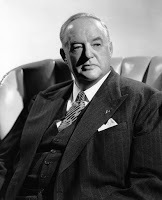 1. Sydney Greenstreet did not appear in a movie until he was 62. His film debut was pretty memorable, though—he played Kasper Gutman in The Maltese Falcon.
1. Sydney Greenstreet did not appear in a movie until he was 62. His film debut was pretty memorable, though—he played Kasper Gutman in The Maltese Falcon.
2. Despite a number of popular supporting performances (e.g., Casablanca, Christmas in Connecticut, Devotion), etc., he received only one Oscar nomination. That was for The Maltese Falcon and he lost in the Best Supporting Actor category in 1941 to Donald Crisp (How Green Was My Valley). It was a strong field that year, with the other nominees being James Gleason (Here Comes Mr. Jordan), Walter Brennan (Sergeant York), and Charles Coburn (The Devil and Miss Jones).
3. Greenstreet’s screen career consisted of just 23 films made between 1941 and 1949. Warner Bros. paired him with his Maltese Falcon co-star Peter Lorre nine times.
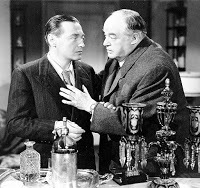 With Peter Lorre in Three Strangers.4. Peter Lorre said of Sydney Greenstreet: “He was not only one of the nicest men and gentlemen I’ve ever known, I think he was one of the truly great, great actors of our time.” According to the biography The Lost One: A Life of Peter Lorre by Stephen Youngkin, Lorre referred to Greenstreet as “the old man,” while Greenstreet called Lorre “Puck.”
With Peter Lorre in Three Strangers.4. Peter Lorre said of Sydney Greenstreet: “He was not only one of the nicest men and gentlemen I’ve ever known, I think he was one of the truly great, great actors of our time.” According to the biography The Lost One: A Life of Peter Lorre by Stephen Youngkin, Lorre referred to Greenstreet as “the old man,” while Greenstreet called Lorre “Puck.”
5. Tennessee Williams dedicated his 1946 one-act play The Last of the Solid Gold Watches to Sydney Greenstreet. Williams conceived the role of an “old-time traveling salesman” with Greenstreet in mind for the lead (Vincent Price played the part in 1947 at a small theatre in Los Angeles.)
6. Greenstreet provided the voice of Rex Stout’s portly sleuth Nero Wolfe in a half-hour 1950-51 NBC radio program (you can easily find episodes on the Internet). Fans of Stout’s books often criticize the series for taking too many liberties (e.g., Wolfe rarely mentions his orchids and, though reclusive, he's willing to leave his beloved brownstone on occasion).
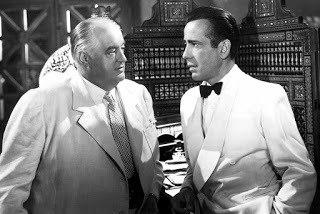 Sydney Greenstreet and Humphrey Bogart in Casablanca.7. Sydney Greenstreet, who battled kidney disease and diabetes, died in 1954 at age 74. Despite a brief acting career, he created a pantheon of memorable characters. My favorite may still be Kasper Gutman, so I leave you with this quote from The Maltese Falcon(imagine it delivered by Mr. Greenstreet—as only he could): “I couldn't be fonder of you if you were my own son. But, well, if you lose a son, it's possible to get another. There's only one Maltese Falcon.”
Sydney Greenstreet and Humphrey Bogart in Casablanca.7. Sydney Greenstreet, who battled kidney disease and diabetes, died in 1954 at age 74. Despite a brief acting career, he created a pantheon of memorable characters. My favorite may still be Kasper Gutman, so I leave you with this quote from The Maltese Falcon(imagine it delivered by Mr. Greenstreet—as only he could): “I couldn't be fonder of you if you were my own son. But, well, if you lose a son, it's possible to get another. There's only one Maltese Falcon.”
This post is part of the What a Character! blogathon co-hosted by Once Upon a Screen . It was delayed from last week and now technically starts on November 21st. Click here for the full schedule.
 1. Sydney Greenstreet did not appear in a movie until he was 62. His film debut was pretty memorable, though—he played Kasper Gutman in The Maltese Falcon.
1. Sydney Greenstreet did not appear in a movie until he was 62. His film debut was pretty memorable, though—he played Kasper Gutman in The Maltese Falcon.2. Despite a number of popular supporting performances (e.g., Casablanca, Christmas in Connecticut, Devotion), etc., he received only one Oscar nomination. That was for The Maltese Falcon and he lost in the Best Supporting Actor category in 1941 to Donald Crisp (How Green Was My Valley). It was a strong field that year, with the other nominees being James Gleason (Here Comes Mr. Jordan), Walter Brennan (Sergeant York), and Charles Coburn (The Devil and Miss Jones).
3. Greenstreet’s screen career consisted of just 23 films made between 1941 and 1949. Warner Bros. paired him with his Maltese Falcon co-star Peter Lorre nine times.
 With Peter Lorre in Three Strangers.4. Peter Lorre said of Sydney Greenstreet: “He was not only one of the nicest men and gentlemen I’ve ever known, I think he was one of the truly great, great actors of our time.” According to the biography The Lost One: A Life of Peter Lorre by Stephen Youngkin, Lorre referred to Greenstreet as “the old man,” while Greenstreet called Lorre “Puck.”
With Peter Lorre in Three Strangers.4. Peter Lorre said of Sydney Greenstreet: “He was not only one of the nicest men and gentlemen I’ve ever known, I think he was one of the truly great, great actors of our time.” According to the biography The Lost One: A Life of Peter Lorre by Stephen Youngkin, Lorre referred to Greenstreet as “the old man,” while Greenstreet called Lorre “Puck.”5. Tennessee Williams dedicated his 1946 one-act play The Last of the Solid Gold Watches to Sydney Greenstreet. Williams conceived the role of an “old-time traveling salesman” with Greenstreet in mind for the lead (Vincent Price played the part in 1947 at a small theatre in Los Angeles.)
6. Greenstreet provided the voice of Rex Stout’s portly sleuth Nero Wolfe in a half-hour 1950-51 NBC radio program (you can easily find episodes on the Internet). Fans of Stout’s books often criticize the series for taking too many liberties (e.g., Wolfe rarely mentions his orchids and, though reclusive, he's willing to leave his beloved brownstone on occasion).
 Sydney Greenstreet and Humphrey Bogart in Casablanca.7. Sydney Greenstreet, who battled kidney disease and diabetes, died in 1954 at age 74. Despite a brief acting career, he created a pantheon of memorable characters. My favorite may still be Kasper Gutman, so I leave you with this quote from The Maltese Falcon(imagine it delivered by Mr. Greenstreet—as only he could): “I couldn't be fonder of you if you were my own son. But, well, if you lose a son, it's possible to get another. There's only one Maltese Falcon.”
Sydney Greenstreet and Humphrey Bogart in Casablanca.7. Sydney Greenstreet, who battled kidney disease and diabetes, died in 1954 at age 74. Despite a brief acting career, he created a pantheon of memorable characters. My favorite may still be Kasper Gutman, so I leave you with this quote from The Maltese Falcon(imagine it delivered by Mr. Greenstreet—as only he could): “I couldn't be fonder of you if you were my own son. But, well, if you lose a son, it's possible to get another. There's only one Maltese Falcon.”This post is part of the What a Character! blogathon co-hosted by Once Upon a Screen . It was delayed from last week and now technically starts on November 21st. Click here for the full schedule.
Published on November 23, 2015 12:50
Gravetapping by Ben Boulden No Comment: "The November Man"
Gravetapping by Ben Boulden“It must be the same as deprogramming a Jesus freak: The intellectual argument never counted because there was no intelligence involved.”
—Bill Granger, The November Man (There are No Spies). Grand Central Publishing PB, 2014 (© 1986). Page 157. Lydia Neumann speaking to Margot Kieker.
[No Comment is a series of posts featuring passages that caught my attention. It may be the idea, the texture, or the presence that grabbed my eye. There is no analysis provided, and it invariably is out of context]
Purchase a copy of The November Man at Amazon.
—Bill Granger, The November Man (There are No Spies). Grand Central Publishing PB, 2014 (© 1986). Page 157. Lydia Neumann speaking to Margot Kieker.
[No Comment is a series of posts featuring passages that caught my attention. It may be the idea, the texture, or the presence that grabbed my eye. There is no analysis provided, and it invariably is out of context]
Purchase a copy of The November Man at Amazon.

Published on November 23, 2015 07:58
November 22, 2015
In Praise of Robert Ryan
(thanks to Peter Winkler for the link) the L Magazine
"If most movie stars embody one or another of our treasured notions about who we are, Robert Ryan quickly became a shadow-self, a fathomless well of postwar America's weaknesses, insecurities, prejudices and demons. In Fred Zinnemann's 1948 Act of Violence, he's the war buddy who torments Van Heflin—the solid homesteader of so many Westerns, here symbolically cast as a suburban contractor—with knowledge of his dark past. A few years ago, The L's Nicolas Rapold pointed out Act's striking similarities to A History of Violence: Ryan is the specter of our worst capabilities, but also a conflicted, sympathetic character. Zinnemann keeps the camera on him as he stands just outside the threshold of Heflin's comfy house, waiting to mete out his long-sought vengeance but also starting guiltily at the sound of a woman's voice from inside, sweating and grimacing and trying to slow his churning heartbeat.
"Ryan was always either pursuer or pursued, or maybe both, but he brought nearly infinite nuance and variety to his boogeymen. In Fritz Lang's Clash By Night (1952), as the small-town projectionist who hounds Barbara Stanwyck, he's full of loathing borne of self-knowledge and given flight by Clifford Odets's baroque, steel-edged dialogue; he's more raw as the racist bankrobber in Robert Wise's Odds Against Tomorrow (1959), with its great wintry uptown and upstate locations. Blacklisted screenwriter Abe Polonsky makes the film's heist into a racial allegory, plagued by tensions between Ryan and angry Harry Belafonte: most Ryan performances are psychoanalytic inquiries into the social ills of postwar America, revealed as hateful or frightened or drunk, but Polonsky makes it explicit, and the liberal Ryan, despite his conscientious disapproval of his character (which he discussed with the activist press), grants himself access to stores of blind, omnidirectional hatred in a relentlessly self-flagellating performance (check that bitter smile as he delivers his first line of dialogue, addressing a small African-American girl in mock dialect).
for the entire article go here:
http://www.thelmagazine.com/gyrobase/...
Published on November 22, 2015 12:13
November 21, 2015
cool article ‘Emperor of the North’ and ‘Wind Across the Everglades’: Fighters in Nature and Showbiz
‘Emperor of the North’ and ‘Wind Across the Everglades’: Fighters in Nature and ShowbizBy J. HOBERMANNOV. 20, 2015 The New York Times
for the entire article go here:
http://www.nytimes.com/2015/11/22/mov...
 Lee Marvin plays a hobo tormenting a railroad brakeman in Robert Aldrich’s “Emperor of the North” (1973). The best of those studio directors who, more or less the same age as Orson Welles, began working in movies within a decade of “Citizen Kane” (1941) represent Hollywood’s “greatest generation.” Survivors of the Great Depressionand often veterans of World War II, they fought the good war against assembly-line filmmaking. Robert Aldrich(1918-83) and Nicholas Ray (1911-79) were two.
Both men specialized in unconventional genre movies with larger-than-life antiheroes. Their vigorous melodramas and baroque action films were often self-consciously American. Like other members of the greatest generation, they were influenced by Ernest Hemingway’s emphasis on rites of midcentury existential manliness — although Aldrich’s “Emperor of the North” (1973), out on Blu-ray from Twilight Time, was inspired by the writing of and about Jack London, Hemingway’s precursor in literary swagger.One of the strongest movies of Aldrich’s late career, “Emperor of the North” (a project originally intended for the mad macho man Sam Peckinpah) concerns the near-cosmic struggle between a laconic super-hobo known as A-No. 1 (Lee Marvin) and an implacably sadistic railroad employee (Ernest Borgnine) called simply the Shack, hobo slang for brakeman. The Shack is a killer who has never allowed a vagrant aboard his train; the ’bo who gets by him will be crowned Emperor of the North Pole, a pointedly meaningless honor that gave the movie its original title.“The Road,” London’s memoir of riding the rails, was a tale of the 1890s; Christopher Knopf’s screenplay updates the action to 1933. The movie’s tone is post-“Bonnie and Clyde” Hollywood new wave, a scenic outlaw ballad mixing instances of extreme violence with ragtime high jinks. Lyrical passages with the sunlight streaming through the boxcar slats slam up against brawny Soviet-style montages of steel and steam. There are flickers of soft-focus period nostalgia, but the movie’s anti-authoritarianism is as resolute as the snub nose on Marvin’s fist-like face.“Emperor of the North” opened a year after Martin Scorsese’s underappreciated “Boxcar Bertha” starred Barbara Hershey as a rail-riding union organizer. But Aldrich’s movie — a briefly glimpsed and appropriately hard-boiled young woman aside — plays out in an almost exclusively male world. Romantic interest, such as it is, is provided by a good-looking, aggressively callow aspiring hobo (Keith Carradine) named Cigaret (after London’s on-the-road nom de guerre), who functions as A-No. 1’s unwilling sidekick and pesky nemesis.
Lee Marvin plays a hobo tormenting a railroad brakeman in Robert Aldrich’s “Emperor of the North” (1973). The best of those studio directors who, more or less the same age as Orson Welles, began working in movies within a decade of “Citizen Kane” (1941) represent Hollywood’s “greatest generation.” Survivors of the Great Depressionand often veterans of World War II, they fought the good war against assembly-line filmmaking. Robert Aldrich(1918-83) and Nicholas Ray (1911-79) were two.
Both men specialized in unconventional genre movies with larger-than-life antiheroes. Their vigorous melodramas and baroque action films were often self-consciously American. Like other members of the greatest generation, they were influenced by Ernest Hemingway’s emphasis on rites of midcentury existential manliness — although Aldrich’s “Emperor of the North” (1973), out on Blu-ray from Twilight Time, was inspired by the writing of and about Jack London, Hemingway’s precursor in literary swagger.One of the strongest movies of Aldrich’s late career, “Emperor of the North” (a project originally intended for the mad macho man Sam Peckinpah) concerns the near-cosmic struggle between a laconic super-hobo known as A-No. 1 (Lee Marvin) and an implacably sadistic railroad employee (Ernest Borgnine) called simply the Shack, hobo slang for brakeman. The Shack is a killer who has never allowed a vagrant aboard his train; the ’bo who gets by him will be crowned Emperor of the North Pole, a pointedly meaningless honor that gave the movie its original title.“The Road,” London’s memoir of riding the rails, was a tale of the 1890s; Christopher Knopf’s screenplay updates the action to 1933. The movie’s tone is post-“Bonnie and Clyde” Hollywood new wave, a scenic outlaw ballad mixing instances of extreme violence with ragtime high jinks. Lyrical passages with the sunlight streaming through the boxcar slats slam up against brawny Soviet-style montages of steel and steam. There are flickers of soft-focus period nostalgia, but the movie’s anti-authoritarianism is as resolute as the snub nose on Marvin’s fist-like face.“Emperor of the North” opened a year after Martin Scorsese’s underappreciated “Boxcar Bertha” starred Barbara Hershey as a rail-riding union organizer. But Aldrich’s movie — a briefly glimpsed and appropriately hard-boiled young woman aside — plays out in an almost exclusively male world. Romantic interest, such as it is, is provided by a good-looking, aggressively callow aspiring hobo (Keith Carradine) named Cigaret (after London’s on-the-road nom de guerre), who functions as A-No. 1’s unwilling sidekick and pesky nemesis.
Published on November 21, 2015 08:12
Ed Gorman's Blog
- Ed Gorman's profile
- 118 followers
Ed Gorman isn't a Goodreads Author
(yet),
but they
do have a blog,
so here are some recent posts imported from
their feed.



